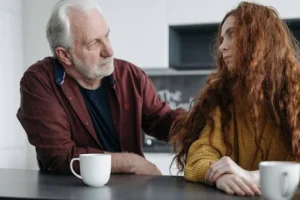How Connecting With Others Can Help Benzodiazepine Addiction Recovery

Finding support in benzodiazepine addiction recovery is paramount, and it can take many shapes and forms. Let’s delve into two lesser-known aspects of support: peer-led support groups and online recovery communities. Both offer unique benefits that can make a significant difference on your road to recovery.
Peer-led support groups are a tried-and-true approach, allowing you to connect with people who truly understand the journey you’re embarking on, as they’ve been there themselves. You’ll find a camaraderie born of shared experiences, helping you to realise you’re not alone in your struggle. There’s power in shared stories, in knowing others have walked the same path and found their way to recovery. This empathy, understanding, and shared resilience can be extraordinarily empowering, leading to decreased feelings of isolation and increased self-esteem.
However, the potential downside to peer-led support groups is that they lack professional oversight. While the raw, unfiltered shared experiences can be cathartic, the absence of a professional mediator may limit the opportunity for structured growth and could potentially lead to negative or triggering conversations. You may also encounter differing opinions on recovery methods which can sometimes cause confusion or uncertainty.
In contrast, online recovery communities offer a more accessible and less intimidating alternative. Being able to seek support from the comfort and privacy of your own home can make the world of difference, especially for those who may not feel ready to share their experiences face-to-face. Moreover, these communities offer round-the-clock support, giving you a safe space to turn to whenever you need it. The inherent anonymity of online platforms can also provide a comforting degree of detachment, allowing you to open up more freely.
Like their real-world counterparts, online communities may also lack professional guidance. They can sometimes become echo chambers, reinforcing unhelpful behaviours and attitudes if not adequately moderated. Additionally, they lack the direct human connection and immediacy that face-to-face interactions provide, which can be a crucial element in fostering a sense of shared understanding and empathy.
In light of these insights, it’s crucial to balance these sources of support with professional help. Whether it’s through counselling, therapy, or medication, professional guidance offers the structure, evidence-based strategies, and expertise necessary for sustainable recovery. While peer-led groups and online communities provide valuable emotional support and shared experiences, professional help ensures you have a well-rounded, effective recovery plan tailored to your unique needs.
Navigating the landscape of benzodiazepine addiction recovery requires a multi-faceted approach, combining different forms of support to suit individual needs. Beyond peer-led support groups and online recovery communities, emerging trends and additional sources of support include professionally facilitated groups and technology-assisted therapies.
Professionally Facilitated Groups
Professionally facilitated groups meld the benefits of peer-led groups with the structured guidance of a healthcare professional. These groups provide a platform for sharing experiences and peer support, while also ensuring discussions remain constructive and therapeutically beneficial. This professional presence can offer expert insight, mediate differences in recovery viewpoints, and steer individuals away from potential triggers.
Technology-assisted Therapies
As digital health evolves, technology-assisted therapies are becoming more prevalent. Mobile applications, virtual reality, and telehealth services can offer therapeutic strategies, reminders for medication, stress management tools, and means to track progress. This real-time, personalized support can complement traditional recovery strategies and offer easy accessibility.
Comparing Forms of Support
| Peer-Led Support Groups | Online Recovery Communities | Professionally Facilitated Groups | Technology-assisted Therapies | |
|---|---|---|---|---|
| Pros | Empathy & shared experiences; Increased self-esteem | Accessibility; Anonymity; 24/7 support | Balance of peer and professional support; Structured growth | Personalization; Real-time support |
| Cons | Lack of professional oversight; Possible triggering discussions | Potential echo chambers; Lack of direct human connection | May not be as readily available; Possible cost associated | Dependence on technology; Privacy concerns |
FAQ
1. Which form of support is the best for benzodiazepine addiction recovery?
There’s no one-size-fits-all approach to recovery. Each form of support has its unique advantages and drawbacks. It’s crucial to have a balance of peer support, professional guidance, and to use digital tools that complement traditional methods.
2. Can online recovery communities replace therapy or counselling?
While online communities offer valuable emotional support, they should not replace professional therapy or counselling. The expertise, structure, and evidence-based strategies that professionals provide are vital for sustainable recovery.

3. How can I find a professionally facilitated group or technology-assisted therapy?
Your healthcare provider or local health department can provide information on professionally facilitated groups in your area. As for technology-assisted therapies, many applications and platforms are available online or through app stores. Always consult a healthcare professional before starting any new therapy.
In the journey of overcoming benzodiazepine addiction, support comes in various forms, each with its unique value. Whether it’s the shared resilience in peer-led support groups, the round-the-clock accessibility of online recovery communities, the balance of shared experiences and professional guidance in facilitated groups, or the real-time, personalized strategies of technology-assisted therapies – remember that you’re not alone in your journey.
While these sources of support provide valuable assistance, the importance of professional help cannot be overstated. Having a comprehensive, well-rounded recovery plan tailored to your needs is vital in overcoming addiction. The empathy and shared experiences found in support groups, complemented by evidence-based strategies offered by professionals, form a robust network around you.
Remember, recovery isn’t a destination but a journey. It may seem daunting and overwhelming, but every step you take is a testament to your courage and resilience. Each form of support is another ally, another tool in your arsenal, and another beacon lighting your path towards a healthier, brighter future. As you navigate this path, always remember that help is within reach, and you are stronger than your struggles. Every journey begins with a single step, and you have already taken that step by seeking support. Keep moving forward, one day at a time, and believe in your power to overcome.







